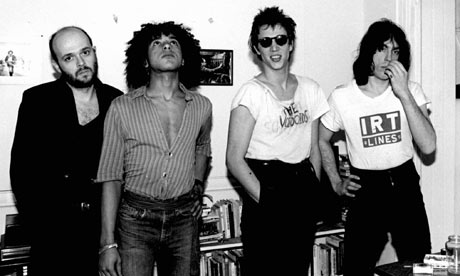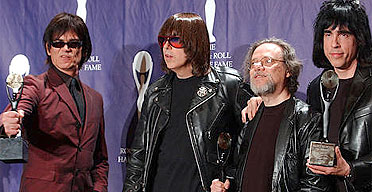The Fifth Ramone
The four original Ramones--Joey, Johnny, Dee Dee and Tommy--had quite a story to tell, and some of them left behind their version, but they're all gone now. Happily, Marky--the guy who replaced Tommy, and saw plenty of the good stuff--has written an autobiography that fills in a lot of what others missed, Punk Rock Blitzkrieg: My Life As A Ramone.
The book surprised me. It's quite entertaining, but I didn't expect the tone. I thought we were going to get the recollections of a headbanging punk, but it's wry and witty, and slightly regretful. I guess the trouble is I keep thinking of Marky as the wild, young drummer, not a man of 62 who's seen a lot and is looking back.
He's actually got quite a story before the Ramones. He doesn't join the band till page 125. Born Marc Bell in 1952, he grew up a hell-raiser who loved to play drums. He joined a band, Dust, that got a record contract before he turned 18. They had some success, toured and broke up before Marc turned 20. Next he played in Estus, Wayne County And The Backstreet Boys and Richard Hell And The Voidoids. Not the biggest names, but not insignificant work either.
Meanwhile, the Ramones created punk music. Bell was part of the whole CBGB scene and knew the band well. Indeed, he was a fan. When drummer Tommy decided he'd had enough, they auditioned Marc (soon renamed Marky--Marcy didn't work) and he was an easy choice.
Each of the band's first three albums were landmarks in the punk world, and their fourth--Road To Ruin, where they broadened their sound a bit--stood up to those classics. Next the band was immortalized in the cult movie classic Rock 'n' Roll High School. Marky admits they weren't great actors, but that was never the point. (The film sure made a fan out of me.)
Up to this point, the Ramones got a lot of critical attention, and had a solid base of fans, but never broke big. To fix that, they hired eccentric but highly successful Phil Spector to produce. He worked them as never before, even pulling a gun on them once. Unfortunately, Spector's "Wall of Sound" didn't fit their stripped down style, and the album, End Of The Century, while it has its moments, was their weakest yet. Worse, it wasn't a huge seller, and it seemed (correctly) the Ramones would never be as big as they deserved.
Marky goes into detail of their tours, done fairly cheaply so they could make money. But the band wasn't easy to get along with. Johnny--the one who cracked the whip--was a loudmouth reactionary. Dee Dee was a hopeless drug addict. And Joey suffered so much from OCD that it took him hours just to leave his apartment. Furthermore, they often feuded, and Joey and Johnny wouldn't even speak to each other.
But the band was magical onstage. And their new albums in the 1980s, such as Pleasant Dreams and Subterranean Jungle, may not compare to the best of the 70s, but still have some good stuff. Meanwhile, Marky was drinking more and more until it was clear he was an alcoholic, and got kicked out of the band. He still couldn't admit he had a problem, but after coming close to killing people in a car accident, he finally started taking AA seriously and has been clean and sober to this day.
After four years on his own, the band took him back. And in the 90s, with punk rock becoming commercial, the Ramones were respected elder statesmen, ready to win over new fans. Their albums still didn't chart high, but they kept selling in catalogue. (In fact, their first album, Ramones, released in 1976, finally went gold in 2014). The new rock gods looked up to them, and in certain areas, such as South America, the Ramones were able to fill stadiums.
The band had done everything it could, and, before they faded away, decided to call it quits. Part of the reason was Joey was quite ill. He died of lymphoma in 2001, before the Ramones were voted into the Rock and Roll Hall of Fame. Not long after that, Dee Dee died of an overdose. A couple years later, Johnny died of prostate cancer. (Both Dee Dee and Johnny are buried in the Hollywood Forever Cemetery, about a mile from where I live. Johnny had a huge collection of movie and sports memorabilia, and I won one of his horror film videotapes in a raffle.) Tommy, the forgotten Ramone, died last year, leaving Marky as the only Ramone left who counts.
In the book, Marky calls it as he sees it. He loves these guys, and loves the music they made, but isn't afraid to show them warts and all. Too bad we'll never know how his bandmates would have reacted. But at least we get to enjoy it.





8 Comments:
So I saw them in the Summer of 1983 and that would have been Marky not Tommy, right?
Is Johnny the one with the Prince Valiant haircut? After the gig ended that night (as I recall, "Psychotherapy" was the song on the radio at the time), the place turned into a nightclub and he just stood on the balcony staring at the crowd
NEG
At least Johnny was calm. I know people who had run ins with Dee Dee.
Thanks for the tip. I've ordered my copy using the link in your post. Maybe Marky will give you a commission.
Maybe they can make me an honorary Ramone--LaGgy.
"Pajama Guy," I would never presume to say any member of The Ramones did not "really count."
First of all, you are incorrect. C.J. Ramone (Christopher Joseph Ward) was and is certainly a member of The Ramones, as he played in the band for seven years (1989-96) and was hired by The Ramones as the replacement on bass and backing vocals for founding member Dee Dee Ramone (Doug Colvin), even though Dee Dee continued to contribute song compositions to the band after he stopped performing at live shows.
It has also been widely known among devout Ramones fans and rock music scholars that C.J. Ramone helped infuse the band with a shot of energy and youthful enthusiasm at a point when the band could well have broken up due to boredom from rote routines of monotonous live performing and studio work, the latter including substandard musical material compared with the halcyon days of The Ramones.
Analogous to C.J. having joined The Ramones was right after Ron Wood joined The Rolling Stones circa 1975, which gave that equally legendary rock band a renewed sense of creativity and purpose, whose enthusiasm became infectious to both Keith Richards and Mick Jagger after the departure of critical member and guitar virtuoso Mick Taylor, who had become so essential to the first renaissance of the Stones following the death of founding member Brian Jones. Ron Wood also looked more like a Rolling Stone than Mick Taylor ever had, and gave Richards a musician buddy with whom to trade off guitar licks.
C.J. Ramone even contributed original material to The Ramones, the tunes "Scattergun" and "Got a Lot to Say," the former in which he sang lead vocals in the studio and in concerts, along with the very catchy melodic "Strength to Endure" (from the 'Mondo Bizarro' LP) and "Makin' Monsters for My Friends," "The Crusher," "Cretin Family" and the band's anthem (actually a Motorhead cover) "R.A.M.O.N.E.S.," all from the band's studio swansong, 'Adios Amigos."
Comments continued from previous posting:
No musician who was hired by The Ramones should ever be called "not a real Ramone" just because the person was not a founding member of the band, which also means Marky Ramone (Marc Bell) and Richie Ramone (Richard Reinhardt), who also both made significant contributions to the endurance and 22 years' history of The Ramones, who are probably the world's most famous garage rock band.
Perhaps only "Elvis Ramone" (Clem Burke, the drummer of Blondie) could actually be termed "not a real Ramone," since he was hired for only a limited period in the interim between the departure of Richie Ramone and the re-hiring of Marky Ramone. But even Clem Burke served his purpose and made contributions to The Ramones, both in the studio and in live concerts.
Really, any musician who ever played in The Ramones, but especially in concerts, helped the band carry on its musical mission of "Gabba Gabba Heyness."
I miss you Dee Dee, Joey, Johnny and Tommy. And I still like and respect C.J., Marky and Richie too, each and every one of them. Regardless of whatever personal differences existed among certain band members and whichever problems contributed to some having left the band at various points in time, the fact is each of these aforementioned persons helped make the legend that is The Ramones.
In my former career as a music journalist (as a contributing writer to "The Boston Globe," "Boston Rock" and "The Village Voice," and a staff writer for the now-defunct New England-based music magazine "Sweet Potato") I interviewed Joey Ramone on the occasion of the band's then-10th anniversary, on tour to promote the 'Too Tough to Die' album in 1984. And my own former band also played on bills with Dee Dee Ramone and the Chinese Dragons and Marky Ramone and the Intruders. So I certainly know at least a bit about that which I have just written.
By the way, "Pajama Guy," are you a "Pajama Top" or a "Pajama Bottom?"
Thanks for your excellent posts on The Ramones. If you look at my profile, when asked to name my favorite musical acts, they're included.
It was perhaps unfair of me to say later Ramones don't count. They certainly do. My main point was, to me, the essence of The Ramones' sound--what brought them to my attention, and changed the world--is to be found in their first four albums. The band after that, and anyone who joined them after those albums, did not have the same effect. But later Ramones, both live and on record, is still pretty special.
Alas, this blog is down because I couldn't handle the new template which slowed things down so much it wasn't worth posting anything new. But by chance I noticed (three months late) that there were some great new comments. I only hope others eventually see them.
And I sleep without any pajamas at all.
goyard outlet
cheap jordans
off white shoes
golden goose us outlet
Post a Comment
<< Home